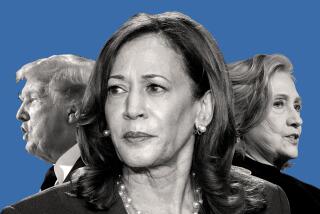Legal experts on Day Two of the Sotomayor hearings
- Share via
Supreme Court nominee Sonia Sotomayor parried tough questions Tuesday from the Senate Judiciary Committee about how race and gender affect a judge’s views on the law. Republicans focused on a single ruling from her 17 years on the federal bench involving a group of white firefighters claiming reverse discrimination. Legal experts said the exhaustive discussion of the New Haven, Conn., firefighters’ case and Sotomayor’s comment about a “wise Latina” making better judgments than a white male spotlighted the dearth of evidence opponents have against her.
--
Constitutional law professor at Loyola Law School
Kimberly West-Faulcon
“There is a lot of theater in raising this issue of race. What she has to convince everyone of is whether she is someone who is going to be fair to everyone who comes before her, even if they don’t share her race and gender identity. This goes back to the Ricci case, and it’s a key issue for the senators who oppose her. They are going to keep at it.
“It says a lot about who she ultimately is that when you look at her record as a judge you see her as a rather moderate judge who, from the thousands and thousands of cases she has decided, has only one that can be pulled out and focused on so much.
“I think you could say that she has a strategy that if she is not going to assuage the senators’ concerns about the ‘wise Latina’ comment completely, that she can at least engage in discussions, as she did on the comments by Sen. [Lindsey] Graham [R-S.C.], that there is a double standard here.
“Her approach is effective because this public hearing setting doesn’t allow for a deep and meaningful dialogue about race. I think we’re going to see more and more questioning of this type as they go through this Kabuki dance.”
--
Ilya Shapiro
Cato Institute senior fellow and editor of its Supreme Court Review
“Graham continues to be the most interesting personality. As someone who studies law, I appreciated his asking whether she is a legal realist or if she’s a strict constructionist or an originalist. I think she answered those questions well, rejecting any sorts of labels. It was smart of her not to be pegged that way.
“Graham did a good job of teasing out her views on Roe vs. Wade, how there are certain broad provisions in the Constitution. What she meant was that we can broadly interpret certain provisions. I think that’s the most substantial answer, not just about abortion but any of the unenumerated rights, that we’ve had from a Supreme Court nominee in quite some time.
“It shocked me, though, and I found it disturbing, almost comical, that he directly asked her if she had problems with her temperament. He actually asked, after reading those anonymous reviews, whether she had a bad temper. I don’t think that discussion was revelatory either way and it’s curious that he pursued it.
“Lindsey has this soft touch in saying he likes her personally. . . . He always had a smile on his face and an easygoing manner even when asking her tough questions. He knew where he was going and she knew where he was going. He’s kind of folksy in doing what he feels he has to do. I thought he was stern but nice.”
--
Erwin Chemerinsky
Constitutional law scholar, dean of UC Irvine School of Law and former visiting professor at Duke University School of Law
“Basically, she said what she needs to say in order to get confirmed. I thought she went out of her way to reassure the Republicans on the committee with the repeated mantra that judges don’t make the law, they apply the law, that she’s not going to be an activist judge, that she respects the limited role of judges.
“My sense is that she came off as smart, well-prepared and at times charming. She was appropriately deferential, yet I think she came across as knowledgeable. I just think she’s done a great job.
“I think the most interesting part for me was the discussion about the comment she made at Duke about how appellate judges make policy. I was on that panel, sitting right next to her. Until she got nominated, I never thought twice of it. She was talking to Duke law students about whether they should be district court clerks or appellate court clerks and she was saying the courts of appeals are more interesting because they make policy. They do make policy.”
-- Carol J. Williams
More to Read
Get the L.A. Times Politics newsletter
Deeply reported insights into legislation, politics and policy from Sacramento, Washington and beyond. In your inbox twice per week.
You may occasionally receive promotional content from the Los Angeles Times.











